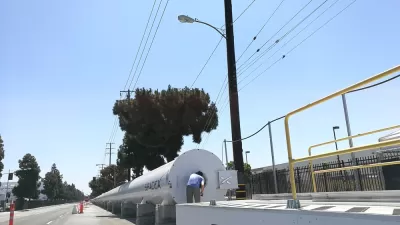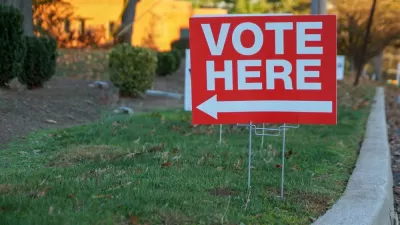About that Hyperloop report…

Aaron Gordon spoke to a number of transit and transportation experts and produces scathing criticism of the recent Great Lakes Hyperloop feasibility study released earlier this week.
The study, published by the Northeast Ohio Areawide Coordinating Agency and Hyperloop Transportation Technologies, estimated the price of the project at $29.8 billion and called for more studies of the project. Studies will be necessary, according to Gordon, because Hyperloop technology is totally unproven.
As such, a Hyperloop feasibility study is a strange document, somewhat like studying the conservation of the unicorn population after a few people strapped a horn onto a horse. As of this writing, Hyperloops have not transported any humans. The maximum speed a test pod has reached is 288 mph, well short of the advertised maximum velocity of 650 mph, or 700, or even 750 (the number varies article by article, not exactly a reassuring testament to the precision of their estimates).
The argument in favor of the Hyperloop doesn't just stop at travel speeds. The feasibility report also touts lofty economic development and job creation figures. There's a very large problem with those estimates, according to Gordon.
That all sounds real good except it’s also totally unclear how they arrived at these numbers. Despite the study’s 156-page length, it is extremely light on methodology or the assumptions baked into the calculations. In fact, any mention of study methodology or assumptions directs inquiring minds to an appendix. However, the feasibility study does not have an appendix, nor does the study’s landing page on NOACA’s website.
Gordon speaks to a number of experts who also noticed those discrepancies in the report, and they all express unequivocal caution at the idea that Hyperloop could possibly live up to the initial billing sold in the feasibility report.
Looming behind all of this Hyperloop discussion, are pressing needs on infrastructure and economic development investment that are already proven, and could provide tremendous benefit to the regions exploring the Hyperloop (the Great Lakes Hyperloop isn't the only one).
FULL STORY: Hyperloop Is The Midwest's Answer To A Question No One Asked

Study: Maui’s Plan to Convert Vacation Rentals to Long-Term Housing Could Cause Nearly $1 Billion Economic Loss
The plan would reduce visitor accommodation by 25,% resulting in 1,900 jobs lost.

North Texas Transit Leaders Tout Benefits of TOD for Growing Region
At a summit focused on transit-oriented development, policymakers discussed how North Texas’ expanded light rail system can serve as a tool for economic growth.

Why Should We Subsidize Public Transportation?
Many public transit agencies face financial stress due to rising costs, declining fare revenue, and declining subsidies. Transit advocates must provide a strong business case for increasing public transit funding.

How to Make US Trains Faster
Changes to boarding platforms and a switch to electric trains could improve U.S. passenger rail service without the added cost of high-speed rail.

Columbia’s Revitalized ‘Loop’ Is a Hub for Local Entrepreneurs
A focus on small businesses is helping a commercial corridor in Columbia, Missouri thrive.

Invasive Insect Threatens Minnesota’s Ash Forests
The Emerald Ash Borer is a rapidly spreading invasive pest threatening Minnesota’s ash trees, and homeowners are encouraged to plant diverse replacement species, avoid moving ash firewood, and monitor for signs of infestation.
Urban Design for Planners 1: Software Tools
This six-course series explores essential urban design concepts using open source software and equips planners with the tools they need to participate fully in the urban design process.
Planning for Universal Design
Learn the tools for implementing Universal Design in planning regulations.
City of Santa Clarita
Ascent Environmental
Institute for Housing and Urban Development Studies (IHS)
City of Grandview
Harvard GSD Executive Education
Toledo-Lucas County Plan Commissions
Salt Lake City
NYU Wagner Graduate School of Public Service




























